
This lesson offers a review of several expressions, prepositions and vocabulary related to schooling and education.
 |
У розмові ми чуємо: |
Ага! Василь та Андрій також забули!
|
 |
|
Although the conjunction та (and) has appeared before in course material, it has never been introduced to you as an alternate word for і(й). Why are there two choices for the word and in Ukrainian? The explanation is simple: to ease the flow of pronunciation in a sentence. If there is a vowel at the end of the previous word or at the beginning of the next consecutive word, the conjunction і(й) affects the flow of speech. A similar example in English would be the choice of the words a or an to ease pronunciation in a sentence (i.e. a table, an apple). Although there is no firm rule in Ukrainian for the use of та and і(й), you are now aware that there is a choice.
 |
У розмові ми чуємо: |
Ну, тоді ви залишіться після лекції!
|
 |
|
The word після (after) was introduced in Lesson 2 as a preposition governed by the Genitive Case. Refresh your memory by reading the examples below.
Після вечірки ми підемо додому.
Куди ви їдете після концерту?
Що ви прочитали після завдання?
Степан покаже мені своє авто після лекції.
XVII. Exercise 4.i
Insert prepositions which are governed by the Genitive Case in the sentences below.
- Ми йдемо _________ тата й мами на сніданок.
- _________ кого ви купили цей торт?
- _________ лекції хлопці й дівчата йдуть __________ бібліотеки.
- Савеля йде ___________ друзів на вечірку __________ школи.
- Ми купили книжку __________ Івана.
- Баба й дідо поїдуть на фарму ___________ дощу.
- Ми не хочемо йти ____________ лікарні!
- Хлопці не будуть відпочивати ____________ спорту, вони хочуть іти ____________ ресторану.
- Прошу не говоріть ___________ мене тепер, бо я читаю.
- Хто хоче грати в шахи ____________ обіду?
 A mystery – solved! A mystery – solved!
 |
У розмові ми чуємо: |
Доброго ранку, хлопці і дівчата!
|
 |
|
In Dialogue 17, you were introduced to the phrase Доброго ранку, meaning 'Good morning'. Perhaps you have also heard Ukrainian speakers say Добрий ранок, a different version of the same phrase. Which form is correct?
You will be pleased to learn that both forms are correct. The phrase Добрий ранок is a literal translation of the two words ‘good' and ‘morning'. The phrase Доброго ранку is a bit more complicated, in that it is part of a sentence which is understood but not stated:
Я бажаю тобі доброго ранку! I bid you a good morning!
It has become common to shorten the greeting to just the last two words. In English, this phrase remains the same, but in Ukrainian, it changes to the Genitive Case. It is used after the verb бажати and responds to the question Чого?
Я бажаю тобі (чого)? Я бажаю тобі доброго ранку!
You are now familiar with most of these expressions:
Good morning! Добрий ранок! Доброго ранку!
Good day! Добрий день ! Доброго дня! Добридень!
Good evening! Добрий вечір!
Good night! Добраніч!
Good bye! До побачення!
XVII. Exercise 4.ii
Using any Ukrainian name in the Vocative Case, decide how you will greet that person at the time given.
4:00 pm - Добридень, Богдане!
- 10:00 am - ____________________________________________
- 7:00 pm - _____________________________________________
- 11:00 pm - ___________________________________________
- 7:00 am - _____________________________________________
- 2:00 pm -______________________________________________
- 1:00 pm - _____________________________________________
- 9:00 am - _____________________________________________
- 6:00 pm - _____________________________________________
- 3:00 am- ______________________________________________
- 8:00 pm - ______________________________________________
 |
У розмові ми чуємо: |
Ага! Василь та Андрій також забули!
|
 |
|
| Ну, тоді ви залишіться після лекції! |
 |
|
Words such as Ага! (Aha!) and Ну … (Well…) provide an expressive outlet for the speaker. These words are spoken in a heightened or distinctly different tone in order to draw attention to what is being said.
XVII. Exercise 4.iii
Place the appropriate expression beside the sentence. Choose from the list given.
| Нарешті! |
Ну, і що? |
Чудово! |
| Доброго ранку! |
Ага! |
Справді? |
| Шкода! |
До побачення! |
Певно! |
• Уже час іти додому. ______________________________________________________
• Діти готові на сніданок. ___________________________________________________
• Восьма година і час уставати. _____________________________________________
• Ви забули скінчити завдання! ______________________________________________
• Ми маємо квитки на гокей. ________________________________________________
• Василь має сто доларів у банку. ___________________________________________
• Я чекаю на тебе півгодини! _______________________________________________
• Підемо грати в теніс у суботу! _____________________________________________
• Ой, я не можу йти на концерт!_____________________________________________
XVII. Exercise 4.iv
Complete the dialogue summary by filling in the blanks with the appropriate form of the word. Note: студентів is the Genitive Plural of студент.
Вчителька, панна Вівчар, і студенти у (школa) _______________. Вона
(просити)________________ студентів (показати)_______________ домашнє завдання.
Тарас, Маруся, Андрій та Василь не (мати) ______________ (домашнє)
_______________ завдання. Вони (забути)______________ завдання вдома. Панна
Вівчар просить студентів залишитися після (лекція)________________.
XVII. Exercise 4.v
Answer the questions about the dialogue by referring to the pictures.
1. |
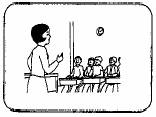
|
2. |

|
|
1. Хто вони?
____________________________
2. Де вони? ____________________________ |
|
1. Про що вона питає?
____________________________
2. Д о кого вона говорить ? ____________________________
|
3. |
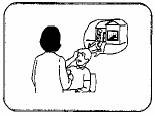
|
4. |
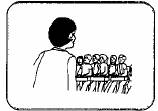
|
|
1. Чого Тарас немає?
____________________________
2. Де він забув завдання ? ____________________________ |
|
1. Хто вчителька ?
____________________________
2. Д е вона працює ? ____________________________
|
5. |
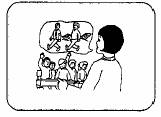
|
|
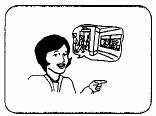
|
|
1. Хто хлопці?
____________________________
2. Що вони забули ? ____________________________ |
|
1. Котрі учні йдуть додому ?
____________________________
2. Котрі учні залишаються у школі? ____________________________
|
XVII . Exercise 4.vi
Choose two of the three sets of words given below and create one paragraph and one dialogue using at least ten of the words in each list. Underline the words which you have used. Be prepared to read your work to your instructor.
школа - директор, учитель, учителька , бібліотека, книжка, словник, журнал, газета, комп'ютер, веб-сайт, файл, е-мейл, пошук, інтернет, е-адреса, е-лист
|
кляса - двері, вікно, стіна, світл o , таблиця (дошка), крейда, карта (мапа), лекція, парта, крісло, шафа, полиця, студент, студентка, друзі, папір, підручник, зошит, список,олівець, перо, ручка, писати, читати, слухати, питати, знати, казати, говорити, відповідати, вчитися, розмовляти, працювати, пам'ятати
|
освіта - наука, інформація, знання, навчання, домашнє завдання, звіт, іспит, писання, читання, відповідь, розмова, мова, математика, географія, хімія, фізика, біологія, фізкультура, спів, танці
|
1.
________________________________________________________________________
________________________________________________________________________
________________________________________________________________________
________________________________________________________________________
________________________________________________________________________
________________________________________________________________________
________________________________________________________________________
________________________________________________________________________
________________________________________________________________________
________________________________________________________________________
________________________________________________________________________
________________________________________________________________________
________________________________________________________________________
________________________________________________________________________
________________________________________________________________________
________________________________________________________________________
________________________________________________________________________
________________________________________________________________________ |
 |
|





 A mystery – solved!
A mystery – solved! 






